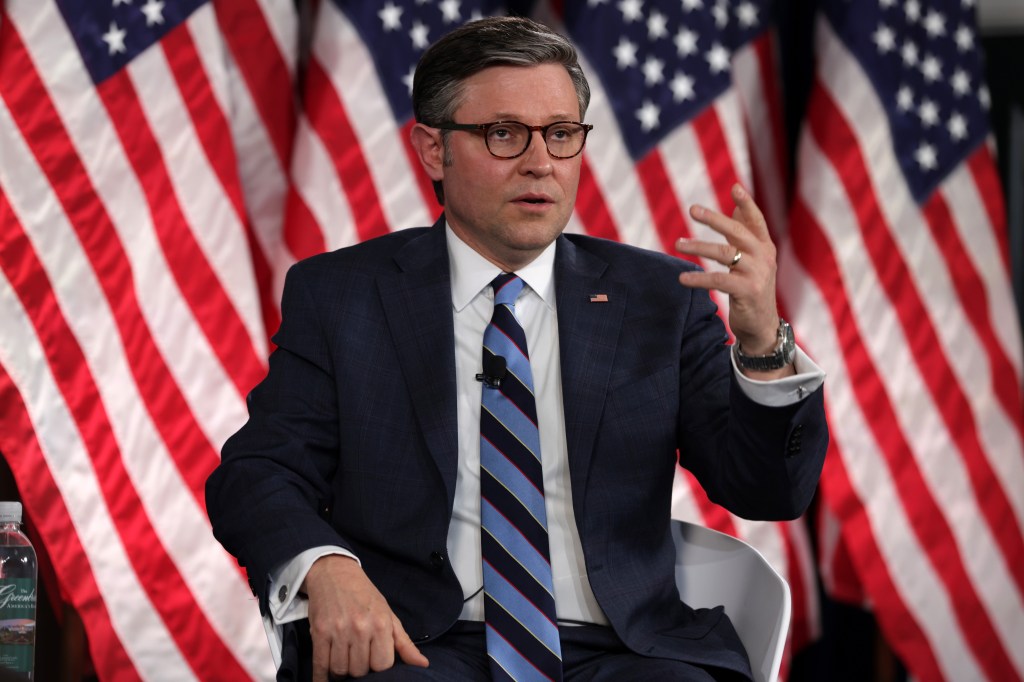Ukraine aid bill takes backseat to funding government, Speaker Mike Johnson tells The Post
WHITE SULPHUR SPRINGS, W.Va. — House Speaker Mike Johnson indicated Wednesday evening that the chamber won’t move on a supplemental aid package for Ukraine until it finishes the work of funding the federal government for the rest of the fiscal year.
Johnson (R-La.) underscored his support for Kyiv against Russia’s invasion during a “Fireside Chat’ with The Post’s Josh Christenson at the House GOP Issues Conference, but claimed that moving too quickly on a bill that includes $60 billion in assistance for Eastern Europe could have sunk government spending talks.
“It was important for us to not put the supplemental in front of the appropriations bills because it would affect, probably, the vote tally ultimately on the appropriations and we had to get our government funded,” Johnson said.
House Republicans have been at odds for approximately six months over government funding and leadership has repeatedly been forced to lean on Democrats to avoid partial government shutdowns.
The intraparty strife over appropriations helped pave the way for the ouster of former Speaker Kevin McCarthy (R-Calif.) last October. Many hardliners in his conference have railed against further Ukraine aid and some have even threatened to try to boot Johnson if he brings up the topic for a vote.
Over the weekend, President Biden signed a roughly $460 billion package featuring six of the 12 spending bills needed to fund the government through Sept. 30, when fiscal year 2024 ends.
Now Johnson is trying to wrangle the remaining six spending bills before a second partial shutdown deadline of March 22. That second batch is expected to account for more than two-thirds of Washington’s total discretionary spending — including for the Pentagon — and therefore will be tougher to steer through Congress.
Last month, the Senate passed a bipartisan $95 billion supplemental bill that included the roughly $60 billion for Ukraine, but Johnson declined to give it a vote in the House, much to the chagrin of Biden.
“We’re processing through all the various options right now on that. It may not look exactly like the Senate supplemental,” Johnson told The Post.
“By the way, I’ll note they worked on that bill — the Senate bill — for about four months, by my count, and they’re expecting me to process in days or weeks,” he added. “I understand the timetable and understand the necessity of the urgency, the funding.”
A deluge of Democrats and even Senate Minority Leader Mitch McConnell (R-Ky.) have urged Johnson to advance the aid package for Ukraine as Kyiv’s forces endure battlefield losses amid a munitions shortage.
“No one wants Vladimir Putin to prevail. I’m of the opinion that he wouldn’t stop in Ukraine. If he was allowed, he’d go through all the way through Europe,” Johnson said Wednesday.
“There is a right and wrong there — a good versus evil, in my view, and Ukraine is the victim here … they were invaded,” he continued. “We stand with good.”
But Johnson pinned the blame for the aid delay on Biden and his administration for not answering “key questions” about the the conduct of the war and its palatable outcomes to the US.
“That process has been dragged out, not because of the House, but because in my view — because of the White House being unwilling or unable to provide the necessary answers for us to process that sooner,” Johnson said.
Keep up with today's most important news
Stay up on the very latest with Evening Update.
Thanks for signing up!
Republicans had also long demanded that any supplemental be paired with US border security reforms, but a Senate deal to tackle both issues went belly up last month and was rejected by Johnson.
“These things are yet unaddressed. The border is wide open. It’s the greatest catastrophe on our shores, of our lifetimes.”
“I’m not the one that introduced the concept of Ukraine and [the] border being tied together in terms of our policy discussions. It was the president himself,” Johnson said.
McCarthy had also pined for border reforms and Ukraine aid to be paired together prior to his fall from the speakership.
Recently, some House Republicans, led by House Problem Solvers Caucus co-chair Brian Fitzpatrick (R-Pa.), have pressed forward with a discharge petition — a legislative technique to bypass Johnson and secure a House vote on Ukraine aid.
Democrats have also plowed ahead with their own discharge petition to take up the Senate-passed $95 billion package.
On Tuesday, the Biden administration unveiled a $300 billion military assistance tranche to Ukraine funded by cost savings from Defense Department contracts.
Johnson also expressed hope that McConnell won’t give up on trying to ink a border reform package.
“I certainly hope that he’s not given up on it because the American people haven’t and they’re demanding our action. We passed H.R. 2 … 11 months ago now. We can’t give up on that — we must insist upon it,” the speaker said.
The House Republican Issues Conference kicked off Wednesday at the Greenbrier resort in West Virginia, with lawmakers huddling to formulate policy ideas for the remainder of the legislative year.
The retreat continues through Friday.

















